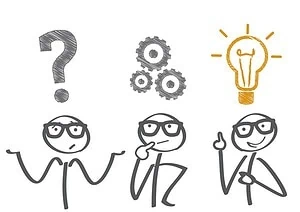Article Contents:
Despite its growing importance, personal branding is often misunderstood. Some see it as self-promotion or a superficial exercise, but it’s about authenticity, consistency, and making meaningful connections.
It’s about being recognized for your true expertise and contributions.
Developing a solid personal brand doesn’t happen overnight—it requires strategic effort.
Whether you share insights to establish thought leadership, build strong networks to foster collaboration or serve as a role model through your actions, there are tangible steps you can take to shape how you are perceived.
In this article, we’ll explore these methods in depth, dispelling common misconceptions and providing practical guidance on how to build a personal brand that aligns with your professional goals and values.
What is Personal Branding?

What is meant by branding from a marketing perspective?
Branding is creating a unique identity about a product or service in the minds of customers or users.
For example, what comes to mind when you hear/think about “ Amazon”?
You may think of a place for buying books or electronic gadgets or a place for buying anything under the sun or a company specialized in e-commerce or IT company, etc. (Actually, Amazon is one of the largest rainforest areas in South America, and most forgot the original thanks to e-commerce platform popularity!)
So what comes to your mind when you think of any product/company is “Branding.”
The same thing applies to an individual as well. That is called personal branding.
Personal branding is the identity of an individual in the minds of others.
For example, when you think of two famous music directors, you may relate one person with classical and another with versatile music. That is your perception of those people based on their offerings, performance, behaviors, and what you usually see from them.
Similarly, what comes to the minds of your colleagues, customers, and junior colleagues when they think about you…..That perception is your personal branding.
Others form ideas/perceptions about ourselves through our skills, behaviors, attitudes, and how we conduct ourselves with others. Eventually, that becomes our identity or personal branding of us.
One of my senior colleagues started his career in sheet metal toolings, and he did well in that specialization. In his later part, he transitioned his career from tooling to people management and psychology studies. Even then, people who had worked with or known him for a longer time used to approach him for any solutions on tooling aspects. That means he had built the perception among peers that he is a specialist in tooling. That is personal branding.
Personal branding is more about what you are known for.
It is not what you claim; it is all about how others perceive you.
In my personal life, when I started my venture after corporate, I focussed more on individual development training for colleges/corporations. I quickly realized that consulting is my strength and switched over to consulting. However, some people perceived me as a trainer for a long time, and breaking that image took a lot of time. Hence, personal branding is not what you think based on your activities; it is all about how others perceive you. That is personal branding.
Now, could you think of yourself.. what are you known for?
That is what you build the personal branding about you in your profession.
If it is positive and unique, you can accelerate your professional growth fast. Otherwise, it slows down your development.
When we are aware of it, we can build a brand around our strengths and unique skills.
Let us discuss some misconceptions about personal branding and how they prevent us from creating it.
Misconceptions about personal branding
we discussed personal branding and its importance in developing professional growth. However, we need some clarification about personal branding, which prevents us from developing it.
Once we understand it, we can build branding around us using our strengths and skills.
Below are some of the misconceptions and the reality.
| # | Misconception | Reality |
|---|---|---|
| 1 | Personal Branding is all about Self-Promotion | Personal branding is not just about self-promotion. It's about authentically showcasing your skills, values, and expertise. Building meaningful relationships and providing value to your customers, colleagues, or employers is equally essential. Without any values and value addition, personal branding is only bragging, and you will soon be exposed. |
| 2 | Personal Branding is only for Extroverts | Introverts can be just as successful in personal branding. It's more about authenticity and effective communication than being extroverted. Introverts can leverage their unique strengths, such as deep listening and thoughtful communication, in building a personal brand. Extroverts seem to find it easy to build; however, introverts can also do it with effort. |
| 3 | Personal Branding is only for business entrepreneurs | Personal branding is beneficial for everyone, not just entrepreneurs. Employees, professionals, and freelancers can all benefit from a strong personal brand. It helps in career growth, job searches, and overall professional development. Nowadays, people under 20 years old have built the brand themselves. |
| 4 | Personal Branding happens overnight | Building a personal brand is a gradual process that requires consistency and effort over time. It does not happen overnight. Patience and persistence are key to developing a strong and lasting personal brand |
| 5 | Personal Branding is only for online presence | While an online presence is crucial, personal branding extends beyond the digital realm. Your behavior, communication skills, and contributions in the workplace also contribute to your brand. It's about the holistic perception others have of you. |
| 6 | Personal Branding means having a perfect image or appearance | Nobody is perfect, and personal branding doesn't require a flawless image. Authenticity is key. Acknowledge your strengths and weaknesses, and be genuine in your interactions. People connect more with authenticity than perfection. We discussed charisma vs authenticity sometime back. |
| 7 | Personal Branding is Static | Personal brands evolve with time and experience. Your brand may need adjustments as your career progresses or as industry trends change. Regularly assess and adapt your personal brand to stay relevant and authentic. It is dynamic. |
| 8 | Personal Branding is only for young professionals | Personal branding is valuable at any career stage. Seasoned professionals can leverage their experience and wisdom to enhance their personal brand. It's about showcasing the journey and expertise, regardless of age. |
| 9 | Personal Branding Guarantees Success | While a solid personal brand can open doors and create opportunities, success is not guaranteed. Hard work, skills, behaviors, and a strategic approach are equally important. Personal branding is a tool, not a guarantee. |
You may have some other personal branding ideas; write to me, and I will clarify them.
We need to properly understand personal branding, which helps us build one around us for professional growth.
Now, let us discuss the methodologies to develop personal branding in a professional environment.
Sustainable ways to develop personal branding in a professional environment
Let us discuss how one can develop personal branding inside the organization.
There is no shortcut, and the efforts one should take are time-consuming; however, they will yield sustainable results.
I would recommend the following three methods to develop personal branding in a professional environment.
- Developing Thought Leadership
- Collaboration & Learning
- Lead By Example
Developing Thought Leadership
Thought Leadership :
Thought leadership refers to being recognized as an authority or expert in a particular field due to innovative ideas, insights, and expertise.

It goes beyond simply knowing a subject; it involves influencing the conversation within that field by providing valuable perspectives, solutions to challenges, and forward-thinking insights.
A Thought leader is respected and sought after for their expertise and often drives discussions, sets trends, and inspires others within their community.
For example,
You may be the purchase manager, and with your experience, you may be doing your job right. When will you become a thought leader in your domain?
When you regularly showcase your insights and expertise and educate your community on purchasing trends, proven practices of managing stakeholders, pricing and negotiation strategies, etc., you will become known as an expert in the purchase. Then, people will perceive you as an expert in purchase, a thought leader, or a go-to expert on purchase-related queries.
How can one develop Thought Leadership inside the organization?
- Identify Your Expertise: First, determine your areas of expertise, knowledge, and passion within your field. Focus on subjects where you have unique insights or experiences that can add value to your organization.
- Share Insights and Ideas: Actively contribute to discussions, meetings, and brainstorming sessions within your team or department. Share your perspectives, offer innovative ideas, and provide solutions to challenges based on your expertise.
- Create Internal Content: Write articles or reports on topics relevant to your organization and share them through internal communication channels such as company newsletters, intranet platforms, or team collaboration tools. Provide practical insights, proven practices, or case studies that can benefit your colleagues and contribute to knowledge sharing within the organization.
- Participate in Training and Development: Offer to lead training sessions and workshops on topics aligned with your expertise. Share your knowledge and skills with colleagues who can benefit from your insights and create opportunities for dialogue and learning within the organization.
- Mentorship and Coaching: Serve as a mentor or coach to junior colleagues or new hires who can benefit from your guidance and expertise. Share your experiences, provide advice, and offer support to help others develop their skills and knowledge within the organization.
Ultimately, Thought leadership is about establishing credibility, building trust, and making meaningful contributions to a field or industry to drive positive change and advancement.
It needs consistent effort and is time-consuming.
Colloboration to develop personal branding
Collaborating and learning:
Engaging with others to enhance your reputation, credibility, and visibility is essential for personal branding.
How can one collaborate with others inside the organization?
Leading cross-functional projects:
Participating in cross-functional projects is one of the biggest opportunities to showcase your skills. Taking the initiative to lead such projects demonstrates your leadership skills, initiative, and ability to work effectively with diverse teams.
By working with a cross-functional team to solve critical business issues, you can showcase your problem-solving skills, project management abilities, and the ability to manage diverse people skills.
This enhances your branding as a proactive, results-driven leader who can bring teams together.
Seeking feedback :
Actively seeking feedback from colleagues and supervisors on collaborative projects allows you to assess your performance, identify areas for improvement, and demonstrate your commitment to continuous growth and development.
This enhances your branding as a collaborative, receptive team member who values feedback and strives for excellence in their work.
In addition to the above methods, the following method will take your branding to new heights, but it requires consistent effort.
Leading by Example
Being consistent through positive behavior and conduct can make you stand out and improve your organizational visibility.
For example,
You demonstrate your dependability when you commit to and follow through on something.
When others are focused on problems, demonstrating a solution-oriented approach can make you the go-to person for solving problems.
Summary on developing personal branding in a professional context
Personal branding :
Personal branding is all about a strong positive perception of others about YOU. What do you stand for?
It is all about what you are known for. It is all about YOU. It is not what you think about yourself; it is what others think about you.
Why is personal branding required?
In an organization, everyone is doing their job and competing for higher growth. How you stand out will determine your quality of growth. Unconsciously, we create some perceptions about ourselves to others through our consistent behaviors, either positive or negative, and actions formally or informally inside the organization.
Some people are aware of it and meticulously build their branding. It is never too late to start.
Some misunderstandings about personal branding prevent us from developing.
- Some people misunderstand personal branding, thinking it is all about self-promotion. In fact, that is a thin-line difference. The world will easily differentiate the people who boast without any value.
- It is not about social media presence; it just amplifies the reach.
- Developing personal branding is a lifetime exercise, and there is no shortcut. As we have witnessed in public life, any short-term popularity will fade away soon.
- It is required for all age groups and any levels in the organizations
- It is not a one-time effort; you need to live up to expectations, or the image created
- It is not only for extroverts; even introverts can develop even more powerful than extroverts
How can one develop personal branding inside the organization?
- Consistent thought leadership development efforts around core subjects or functional domains, working on cross-functional projects, and solving problems
- Sharing knowledge/insights with fellow employees and helping colleagues to succeed.
- Leading by example is a powerful way to build positive branding around you.
Investing in personal branding is a standout effort from the crowd. It is required in a competitive world, and the return on such investment is huge in terms of professional growth.



